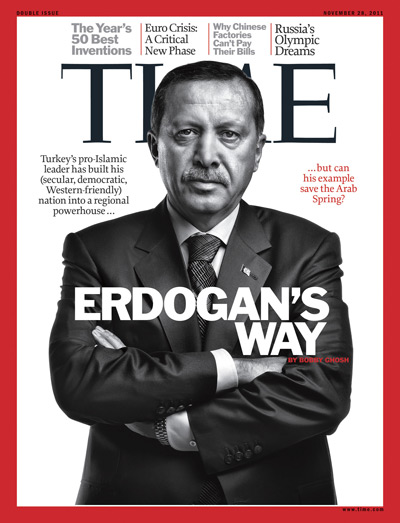
As Turkish leaders assert their authority in the wake of an attempted coup on Friday, President Recep Tayyip Erdogan is working to convince the world that he maintains control over the nation. For Erdogan, that control has been hard won.
In 2002, shortly after his AKP party won a wide majority in the Turkish parliament, TIME profiled the leader then dubbed “Turkey’s mystery man,” examining how he had first come to national prominence:
Though Erdogan is positioned to be the focus of power in the new government, under current laws he cannot become Prime Minister. At a rally in 1997, he read a poem: “The minarets are our bayonets. The faithful are our soldiers. God is great. God is great.” For that flight of fancy, which he says was meant metaphorically, he was sentenced under laws designed to keep Islamic fundamentalism at bay. He served four months in prison and was barred for life from public office. Nonetheless, his party swept to victory, partly as a protest against Turkey’s Old Guard politicians, who have led the country into an economic crisis. But the election was also a vote against the kinds of laws that put Erdogan in jail. “There would be no need for a call for Shari’a,” Gulden Sonmez, an Istanbul human rights lawyer said, “if you could practice religion freely.”
Born into a working-class family on Turkey’s Black Sea coast, Erdogan moved at age 13 to Istanbul, where he joined the youth wing of a party founded by Necmettin Erbakan, architect of Turkey’s political Islamic movement. Erbakan, who later briefly became Prime Minister, saw in the tall young soccer fanatic an ambitious orator of considerable charm.
Elected mayor of Istanbul in 1994, Erdogan banned alcohol from city-owned cafes but also managed to resurrect a failing freshwater supply and clear the trash from the city’s cobblestone streets. Rusen Cakir, Erdogan‘s biographer, stresses the politician’s provincial upbringing and working-class values. “Unlike Erbakan, who was a spiritual father,” he says, “Erdogan is more familiar, like a brother.” Aslihan Dede, 21, a student journalist wearing a Muslim head scarf in Istanbul said last week, “He is one of us.” He is also, says Cakir, a pragmatist: “He is Muslim, but he is looking for a new deal.” Erdogan sent two daughters to Indiana University in part to evade Turkey’s prohibition against wearing Muslim head scarves in public universities. But he also admires American education. “He could have sent them to Tehran,” notes a Western diplomat. “That says a lot.”
And by the next year, he had in fact become Prime Minister: the rule that kept him from power had been changed. That would not be the last time that Turkey changed to accommodate a greater role for the politician. In 2010, for example, Erdogan’s party won a referendum that, as TIME put it, was “designed to curb the outsize political influence of the Turkish military and judiciary.” In 2011, the party won its third consecutive major parliamentary victory. He personally told TIME that he was “still determined” for Turkey to join the E.U., and the magazine’s Bobby Ghosh noted that Erdogan couldn’t “help smiling at the irony that his country, once described as ‘the sick man of Europe,’ is now economically ascendant, while many members of the club that won’t admit him are all but bankrupt.” Later that year, polls found that, in the wake of the Arab Spring, he was seen as having led his country to “having played the most constructive role in Arab events.” In 2013, he helped organize significant diplomatic victories in Turkey’s relationships with Israel and with Kurdish rebels.
Get your history fix in one place: sign up for the weekly TIME History newsletter
Even so, he had his detractors: “He has, it is true, also displayed an autocratic streak, running roughshod over political rivals, tossing enemies into jail and intimidating the media,” TIME reported in a 2011 profile. “Critics say Erdogan‘s government is censoring the Internet, muzzling regulators and interfering in academic institutions. But to his admirers, these failings pale against his successes. Democratic, economically ascendant and internationally admired: as political templates go, Turkey’s is pretty irresistible to people shaking off decades of authoritarian, impoverishing rule—and to Westerners worried about what those people might do next.” And in 2013, his “heavy-handed” response to protesters in Istanbul’s Taksim Square drew the world’s attention to those people in Turkey who wanted a new leader.
In 2014, after three terms as Prime Minister—the limit, under party rules—he was elected President, a change that signaled a shift in power in the Turkish government. Though Presidents had been selected by Parliament and held little real power in the past, Erdogan was elected directly by the people and quickly showed signs that he intended to play a larger role than past Presidents had.
In 2015, after what looked like it might be a slip in power, AKP surprised some observers with another landslide victory, and—despite the latest attempt by Turkey’s army to change things—it now seems that Erdogan’s power will continue through at least one more trial.
Read a 2011 TIME interview with Erdogan, here on TIME.com: 10 Questions for Recep Tayyip Erdogan
More Must-Reads from TIME
- Introducing the 2024 TIME100 Next
- The Reinvention of J.D. Vance
- How to Survive Election Season Without Losing Your Mind
- Welcome to the Golden Age of Scams
- Did the Pandemic Break Our Brains?
- The Many Lives of Jack Antonoff
- 33 True Crime Documentaries That Shaped the Genre
- Why Gut Health Issues Are More Common in Women
Write to Lily Rothman at lily.rothman@time.com